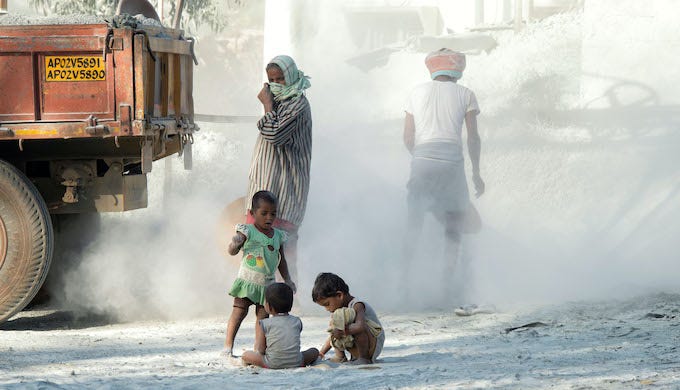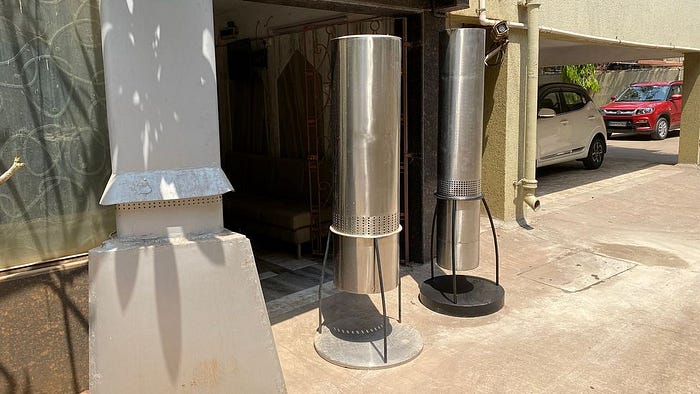Emergent Ventures changes lives — it changed mine.

If you want to build a moonshot, it’s important to understand the concept of asymmetrical opportunities. These are risks one assumes which have a limited downside, but an unlimited upside.
Praan was the moonshot I chose to build. The company was so outré, that no VC/investor wanted to have a serious conversation with us since it involved both a technology risk and a market risk. Not because the market didn’t exist, but because the market wasn’t defined. The mission got us a lot of love from all the investors, but that love didn’t help us pay the bills.
At Praan we build solutions to create hyperlocal clean air environments in very large indoor spaces, semi outdoor spaces, and completely outdoor spaces, but with the goal of making clean air accessible to all.

In mid 2020, during complete lockdowns in India, air pollution had disappeared and we were struggling to stay alive. Praan had $800 in it’s bank account, few scrappy MVPs of our product installed in my building, 47 remote interns working every day, and no customers.
While it may seem like a bad idea to invest in this business, the company however was trying to solve a problem which kills 7 Million people annually, and is a silent pandemic taking away 9–10 years from the lives of people. The problem I’m referring to is that of air pollution, which affects more than 3Bn people every day. It’s the reason behind 1/3 children in New Delhi, Kolkata, Mumbai, and Bangalore growing up with some form of respiratory problems. I can validate that statistic because I am that 1 out of 3 children who grew up with breathing problems.
Everyone believes that it makes more sense to capture the pollutants at the source, and to rely on policy changes to bring about a significant shift in the air quality in these countries which have growing economies. The reality however is that there are fundamentally ‘infinite’ sources of particulate matter in these countries —the paint on building walls degrading, infrastructure projects in cities, vehicular emissions, industrial emissions, natural sources of dust and pollen, and agricultural sources such as stubble burning and fertilizers. The time required to turn all this around is at least 30 years, and in that time, the deaths due to air pollution would go from 7M a year to around 20M a year.
When your house is on fire, you call the fire department immediately. You don’t wait for politicians to bring about a policy change before you can save your house. Today, our cities are filled with the smog from air pollution and it’s actively killing people and taking away years from people’s lives. So why are we suddenly waiting for policy change to take any action?
Praan’s filter-less cluster-based air purifiers are an honest shot at providing cleaner air to people from all strata's of society — creating equal access to cleaner, healthier, air. BBC recently wrote about how a minimum of 1 Million students won’t be able to attend school in New Delhi because of this rampant problem. However, this isn’t just a social issue. There’s a tremendous market opportunity here too. Should we be successful, Praan’s MK One product would cater to a $45Bn market in India alone, without which the country today suffers $150Bn in losses annually. Stripe founder Patrick Collison has also written about this problem on his website here.

One might think that Venture Capital, which by definition means, “capital invested in a project in which there is a substantial element of risk, typically a new or expanding business” would be the perfect source of funding for this, but unfortunately in 2020 I was rejected by more than 100 investors between the US, UK, France, India, and Singapore since they felt, it was still “too early” or “too risky” for early stage investors.
To become investable for most VCs, Praan needed more product-like functional prototypes and some form of market interest which indicated that the TAM for the solution was huge. We were very close, but still needed 12–18 months of work to better define and prove it. However, with $800 left in the bank, and after I had already bootstrapped the company for over 2 years, taken a loan from friends and family to make progress for a year, I had no more personal money to put into this company. Praan was almost dead. We had the willingness and drive to run this race, but no more fuel to make any moves. Fortunately, my friend Nilay Kulkarni was working at Praan at the time and had received a grant from Emergent Ventures previously. He shared his experience with me and eventually introduced me to Dr. Shruti Rajagopalan from Emergent Ventures.
I lucked out. Dr. Rajagopalan was from Delhi, knew exactly what problem I was talking about because she had experienced it first hand. Outside of this, she was very kind, motivating, and supportive and encouraged me to continue to work hard and try to build out Praan. She asked me to apply for the Emergent Ventures grant online and told me that she would try her best to support us. Two days after applying for the grant online, I received an email stating that Emergent Ventures would support Praan with a grant of $22,500 which could be sent out in a few days. This was the largest single check Praan had received till date at the time.
Speed is the winner
Emergent Ventures has a vibe-check test for deciding on people, and no long diligence processes, since these can drastically slow down the rate of progress. I’ve experienced both. I experienced speedy support with Emergent Ventures where I had received a yes within 48 hours, and on the other side experienced 4 months of wait time for diligence with some Indian VC firms, even after that the money never came. FOUR MONTHS! Startups can go from MVP to Growth in four months — keeping founders waiting this long is criminal. EV knows this best, and Dr. Tyler Cowen and Patrick Collison even created Fast Grants to support COVID-19 research, with that same pace! Here’s an amazing video that shows what came out of it and why.
What we did with that $22.5K
EV had committed the grant money to us towards end of September 2020, but I couldn’t accept it in India because we didn’t have a local company here. Accepting the money on my personal name would levy 30% income tax, which was too expensive for a bootstrapped startup. So we went through the painful process in India of setting up a company, opening a bank account and 45 days later I wrote back to EV and they wired us the funds. This money took us from —
- Ugly MVP prototype to brand new device
- Got us access to the key CFD Simulation software we needed — this was a game changer
- We were able to design, build, test, iterate two sets of controller boards and platforms which run our device
- We worked with 3 manufacturers to locally make the Praan MK One device right outside of Mumbai — this was the first time we did commercial manufacturing to understand pain points
- We were able to design, build, test key expensive power supplies and components
- We were able to import commercial grade ozone sensors used by labs globally to prove that our devices produced no ozone
- We were able to drastically increase our rate of progress, even when we were building a hardware company remotely — parts were being shipped around the world and the company didn't’ stop working for a single day! We’ve never had an office till November 1st, 2021.
- We were able to speak with customers and actually began site evaluation, the traction grew so much that in March 2021 that Praan had 4 VC term sheets and even more growing interest.
The $22.5K grant awarded by EV in September 2020 lasted Praan till May 18th, 2021. It kept us alive, it kept us moving, it kept us focused on the goal. A startup which no one wanted to fund suddenly had 4 term-sheets and had signed one.

Unfortunately however, after selecting and signing one term sheet, the lead investor kept dropping our valuation, asked for advisory equity, and dragged us from early March 2021 to mid June 2021. During this time, our bank account ran into the negative and I had borrowed more and more money from my family to keep paying the bills, hoping that this fundraise would close and we’d be able to move forward. We made direct deposits into the company bank account just to ensure the checks didn’t bounce — even when our accountant had advised us to refrain from doing this.
Towards the end of May 2021, I wrote Dr. Shruti Rajagopalan an email sharing our difficult situation and requesting an introduction to Dr. Tyler Cowen — the founder of Emergent Ventures. I received a phone call from her within hours, she empathized with my situation, but as always, she was so amazing, positive, and supportive and asked me not to worry and that we’d find out the right valuation for Praan, speak with key investors/mentors to understand a way out, and still speak with Dr. Tyler Cowen to make key VC intros in the US. She also asked me for an update on the progress, how much money we had left in the bank, how long it would last us, how much time we need to survive, and what money it would take for us to survive that storm. Immediately after learning that we were in the negative, she promised to wire us some more funds to keep us afloat, and to give us a fighting chance with this VC. Emergent Ventures saved us again. She wired us another grant of $25,000 which lasted Praan up until November 2021, and once again, not a day of progress was lost.

Not only did this money keep us alive, it made us feel confident that the company wouldn’t die, it improved our rate of progress, and while working on the air pollution problem, Praan also built, tested, and proved direct air capture of Carbon Dioxide (one of the hottest spaces in the climate tech world) at the Tata Institute of Fundamental Research (TIFR) in Mumbai. Dr. Tyler Cowen sent out few calculated emails to the right people in his network, we heard back from the founder of Social Impact Capital — Sarah Cone, and after a few meetings, they led our $1.5M pre-seed round in the US. This was a jolt of positivity, new energy, support for our mission, and an opportunity for us to be better entrepreneurs with razor focus on our mission. Our journey with social impact capital has been amazing, and I owe this introduction to Emergent Ventures.
Today, Praan has gone through many manufacturing and testing cycles, and is now commercially manufacturing right outside of Mumbai. We are also moving in with our first commercial pilots with real pilot customers in India. We’ve received distribution interest from Mexico, the USA, France, UAE, and Malaysia. While I cannot promise or predict that we will be successful, I can say with utmost confidence that we will make a significant dent in solutions built to tackle urban and industrial air pollution, and propagate the industry forward. Praan today is a company with full-time employees, hiring in the Bay Area and in India, and survived two near-death experiences thanks to the support from Emergent Ventures — they’ve never had any asks or expectations from us in return, they continue to give give give.
Nobody asked me to write this article at 3:00am on a Sunday night. I genuinely feel that more entrepreneurs and young dreamers should get out of bed, chase their dreams, and know that if you show enough progress, there are amazing people like those at Emergent Ventures who will help you make your dreams a reality. I also genuinely feel that Emergent Ventures should have a subsidiary in every country to locally fuel as many projects as possible — this will drastically improve the rate of innovation and progress globally.
If you are a dreamer and are looking to apply to EV for a grant but need some help through the process, please reach out to me anytime here. If you are someone with additional capital and want to see a genuine change made in the world with that capital, you should consider reaching out to the amazing people at EV to be a donor (I don’t know what the process is, but happy to make the intro). It’s something I would do, and will do when I have few more Benjamin Franklins in my personal bank account!
